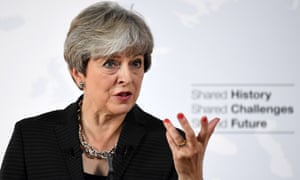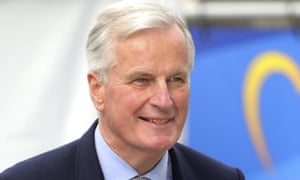Exclusive: Despite Theresa May’s request for two-year transition Brussels sources say exit date likely to be 31 December 2020
The European Union is likely to offer Theresa May a transition period after Brexit of just 20 months, according to senior sources in Brussels.
In her speech in Florence the prime minister formally requested what she had described as an implementation period of “about two years” to cushion Britain’s exit from the EU in March 2019, during which the UK would stay in the single market and customs union.
The Irish government has publicly called for a longer period, of up to five years, to allow businesses to prepare for changes in customs procedures, a proposal that has the support of many in the UK.
However, senior EU officials believe the most likely outcome will involve any withdrawal agreement stipulating 31 December 2020 as the date when the country leaves the bloc’s legal structures.
No decisions have been made and the EU’s 27 remaining member states are yet to formally discuss the terms of a transition period, something they only agreed to do at the end of the last European council summit on Friday.
Earlier this week the EU’s chief negotiator, Michel Barnier, also appeared to suggest that such a schedule would suit the bloc. He told a group of European newspapers: “To my mind, it makes sense that it covers the financial period, so until 2020.”
Such a timetable would coincide with the end of the EU’s seven-year budget in December 2020. The EU is also likely to insist that the UK remain in the common fisheries policy, whose quotas apply to the calendar year – making a December 2020 end to the transition a practical solution, one source said.
Most of the terms of a transition period are not expected to be disputed. But the EU is expecting the British government to argue against the bloc’s condition that access to the single market must be reciprocated by allowing European fishermen to have continued access to British waters.
The environment secretary, Michael Gove, is understood to have told the cabinet earlier this month that fishing policy must be repatriated as soon as Britain leaves the union in what would be a largely symbolic move.
The idea of taking back control of British waters was highly salient during the referendum campaign, culminating in rival boats led by the pop star Bob Geldof and Ukip’s Nigel Farage, who was leading a small flotilla of fishermen, clashing on the Thames.
Jean-Claude Piris, a former head of the European council’s legal service, told the Guardian that while there was no legal requirement to restrict a transition, it could suit the union, if not the UK, to limit it to 20 months. “The transition period may be of any length both parties would agree in the article 50 agreement,” he said. “I think this [20 months] would not be enough for British interests, but they have taken too much time to request such a period, while it [is] obvious they badly need it.”
A UK government spokesman said: “The prime minister proposed a strictly time-limited implementation period of around two years in her Florence speech and was clear in her article 50 letter that agreeing this principle early in the process would help minimise unnecessary disruption. This will require negotiation, and we are ready to begin that conversation as soon as the EU are.”
It has emerged that the Brexit secretary, David Davis, has not yet fixed dates for the next round of talks with Brussels despite an agreement by both sides to accelerate negotiations.
Barnier has proposed three rounds of talks before a European summit in December, the new crunch deadline for assessing whether Brexit negotiations could move on to trade talks.
Officials working for Barnier had suggested three dates: this week, mid-November and just ahead of the EU summit on 14-15 December.
The Department for Exiting the EU has so far not agreed dates despite a decision at a dinner between May and senior European commission officials last week that “efforts should accelerate over the months to come”.
Davis recently accused the EU of dragging out talks “to get more money out of us”. British officials say it would have been premature to embark on talks this week, days after the latest EU summit.
Barnier told May over dinner last week that the EU was ready to accelerate talks, but Britain must do more to meet EU demands. “It takes two to accelerate,” he told reporters the following day.
The coming rounds of negotiations will be crucial if the UK is to meet the EU’s “sufficient progress” test on the Brexit divorce, allowing talks to move on to trade and the future relationship.
After five rounds of talks, the two sides are deadlocked over money, with the EU insisting the UK reveal how it plans to meet the obligations that May acknowledged in her Florence speech. The prime minister has promised €20bn (£17.9bn), but the final bill could add up to €60bn, although the EU insists that in the short-term it only wants a methodology for calculating the bill rather than the final amount.
One senior diplomat told the Guardian that progress in December was “not guaranteed” and depended on the UK: “The Brits are running against the clock and not us.” The diplomat said EU member states were united over getting a firm commitment from the UK on liabilities despite contrasting tones from EU leaders at the recent summit. “The message was very clear on the substance. The speech in Florence was not yet enough.”
A spokeswoman for the Department for Exiting the EU said: “We remain in discussions with the EU task force and will jointly set out in due course a mutually agreed timetable for negotiations that give both sides the best opportunity to build on the momentum of previous rounds and make further progress.”
Since you’re here …
… we have a small favour to ask. More people are reading the Guardian than ever but advertising revenues across the media are falling fast. And unlike many news organisations, we haven’t put up a paywall – we want to keep our journalism as open as we can. So you can see why we need to ask for your help. The Guardian’s independent, investigative journalism takes a lot of time, money and hard work to produce. But we do it because we believe our perspective matters – because it might well be your perspective, too.
I appreciate there not being a paywall: it is more democratic for the media to be available for all and not a commodity to be purchased by a few. I’m happy to make a contribution so others with less means still have access to information.Thomasine F-R.
If everyone who reads our reporting, who likes it, helps fund it, our future would be much more secure. Support the Guardian – it only takes a minute. Thank you.
copiado https://www.theguardian.com/


Nenhum comentário:
Postar um comentário